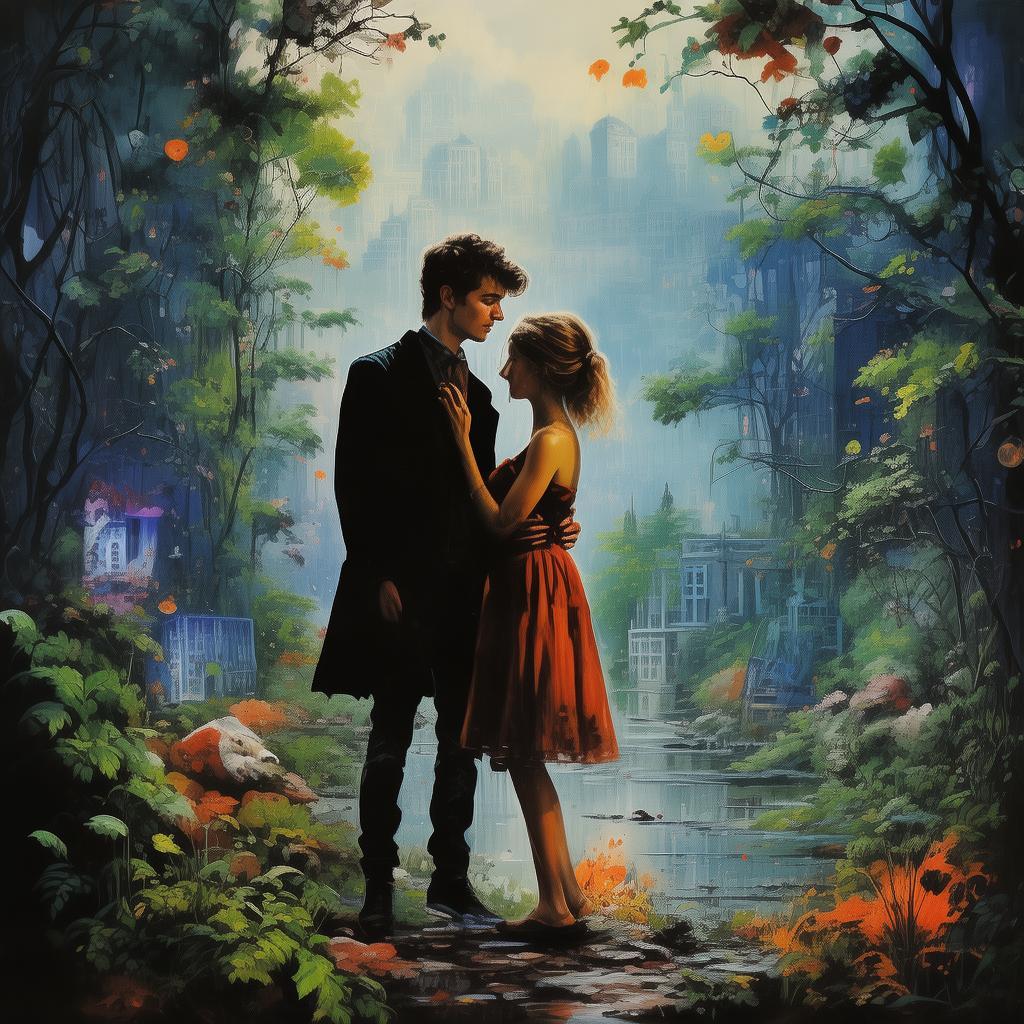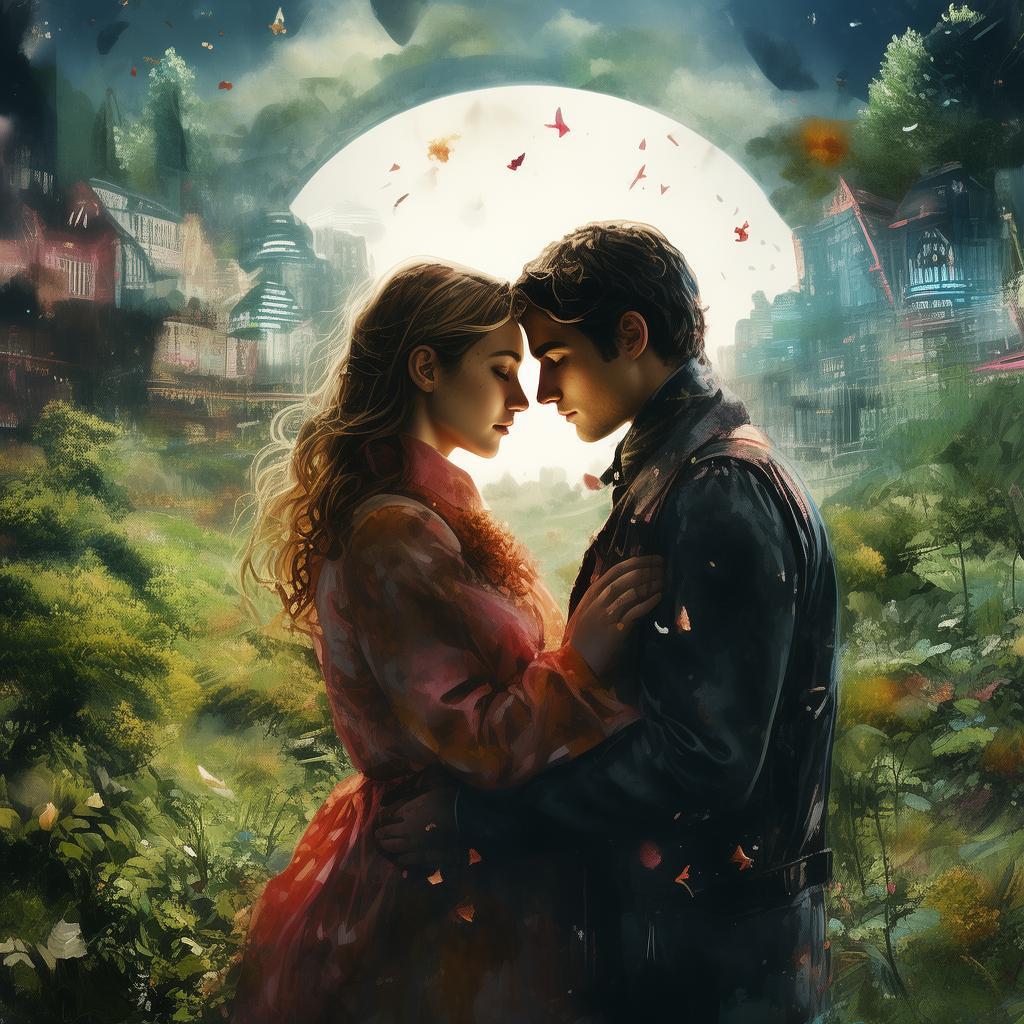The Lament of the Strings: A Silent Love
The air was thick with the scent of roses and the distant sound of strings being tuned. The grand hall of the Royal Music Academy in the city of Lyria was a grandiose display of opulence, with crystal chandeliers casting a soft glow and tapestries of noble histories adorning the walls. Amidst the splendor, two figures stood, each a master of their craft.
Aria, a young violinist with a soulful expression, had been raised within these hallowed walls. Her fingers danced effortlessly over the strings, her music a silent rebellion against the rigid structure of the court. Across the room, however, stood her childhood friend, Elanor, a pianist whose melodies were as enchanting as they were dangerous.
Elanor's presence at the academy was a mystery, as she had no official ties to the noble families that dominated the city. Her origins were shrouded in mystery, yet her music spoke volumes—a language of rebellion and freedom that echoed through the halls of the academy.
"The strings of the violin can be plucked to create beautiful music, but they can also be used as a weapon," Aria whispered, her voice barely above a whisper.

Elanor nodded, her eyes reflecting the intricate patterns of the tapestry. "And the piano can be a lullaby or a thunderous roar, depending on the hands that play it."
Their friendship was a delicate tapestry, woven from shared dreams and the desire to challenge the status quo. But as the political climate in Lyria grew tense, their bond was tested by the whims of the court and the machinations of the nobles.
The king of Lyria, a man who valued his power over his people, had taken an interest in Elanor's music. He saw in her melodies a way to control the populace, to silence dissent, and to maintain his grip on the throne. Aria's father, the head of the Royal Music Academy, was a loyalist to the king. His loyalties were clear, but his heart was torn.
"I must do what is right for the kingdom," he would say, though his eyes betrayed a love that could not be silenced.
Elanor's music was a beacon of hope, a whisper of freedom that stirred the hearts of the oppressed. Aria knew that her father's loyalty to the king would soon clash with her own love for Elanor and her belief in the power of music to bring change.
One evening, as the moon hung low in the sky, Aria and Elanor found themselves in the quiet gardens of the academy. The air was filled with the scent of night-blooming jasmine, and the stars twinkled above.
"Elanor," Aria began, her voice trembling, "the king has asked me to perform at the royal ball. I know it's dangerous, but I can't refuse."
Elanor's eyes softened. "You must do what you believe is right, Aria. And remember, music is a powerful force. It can change the world."
The night of the ball was a grand spectacle, with the finest nobles of Lyria gathered to admire Aria's performance. The music she played was a blend of her own passion and the melodies that had become her silent rebellion. The audience was captivated, but as the final note echoed through the hall, a sudden commotion erupted.
The king had fallen ill, and the court was in chaos. Elanor, whose true identity was revealed as a member of a secret society aiming to overthrow the monarchy, was accused of poisoning the king. The evidence was thin, but the king's loyalists were not to be swayed.
Aria, torn between her loyalty to her father and her love for Elanor, found herself in the thick of the political intrigue. She had to choose between the life she knew and the one she desired.
The trial was a spectacle, with Elanor's fate hanging in the balance. Aria stood by her side, her violin in hand, her music a silent plea for justice. The court was filled with the tension of the moment, and as Aria played, the audience was drawn into a world of emotion and conflict.
The trial ended with Elanor being found guilty, but not before the court was swayed by Aria's music. The people of Lyria began to see the power of music and the potential for change.
In the aftermath, the monarchy was overthrown, and Lyria entered a new era. Aria and Elanor, now united in their cause, used their music to heal the wounds of their nation. Their love story, though silent, had become a legend, a testament to the power of music and the unyielding spirit of love.
The grand hall of the Royal Music Academy was once again filled with the sound of strings and pianos, but this time, it was a celebration of freedom and unity. Aria and Elanor stood side by side, their music the bridge between the past and the future.
In the end, it was not power or politics that won the day, but the unspoken bond between two musicians who believed in the transformative power of love and music.
✨ Original Statement ✨
All articles published on this website (including but not limited to text, images, videos, and other content) are original or authorized for reposting and are protected by relevant laws. Without the explicit written permission of this website, no individual or organization may copy, modify, repost, or use the content for commercial purposes.
If you need to quote or cooperate, please contact this site for authorization. We reserve the right to pursue legal responsibility for any unauthorized use.
Hereby declared.









